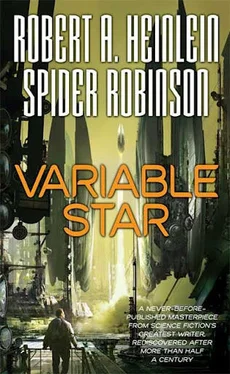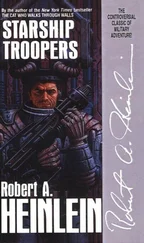Robert A. Heinlein and Spider Robinson
VARIABLE STAR
For the women without whom
none of this would have been necessary:
Bam, Evelyn, Ginny, Jeanne, Amy, Terri Luanna, Ruth, Kate, and Eleanor
In Robert A. Heinlein’s Stranger in a Strange Land there is a story about a Martian artist so focused on his work that he fails to notice his own death, and completes the piece anyway. To Martians, who don’t go anywhere when they die but simply become Old Ones, the burning question was: should this work be judged by the standards used for art by the living, or for art by the dead?
A similar situation occurs here for one of the first times on this planet. This book is a posthumous collaboration, begun when one of its collaborators was seven, and completed when the other was seventeen-years-dead. Spider Robinson discusses this at length in his Afterword, but a brief explanation at the start may help readers to better appreciate what they’re reading, and to decide by what standards they should evaluate it.
After the passing of Robert Heinlein’s widow, Virginia, in 2003, his archivist/biographer discovered a detailed outline and notes for a novel the Grand Master had plotted in 1955, but had never gotten around to writing, tentatively titled The Stars Are a Clock . Heinlein’s estate executor and literary agent decided the book deserved to be written and read, and agreed that Spider Robinson was the only logical choice to complete it.
First called “the new Robert Heinlein” by the New York Times Book Review in 1982, Robinson has been linked with him in the reviews of most of his own thirty-two award-winning books. The two were close friends. Spider penned a famous essay demolishing his mentor’s detractors called “Rah, Rah, R.A.H.!,” and contributed the introduction to Heinlein’s recently-discovered 1939 first book, For Us, the Living .
It was a pairing as fortuitous as McCartney and Lennon. You are about to read something genuinely unique and quite special: a classic novel fifty years in the making, conceived in the Golden Age of SF by its first Grand Master, and completed in the Age of Cyberspace by one of his greatest students. Variable Star is Robert A. Heinlein’s only collaborative novel—and we believe he would be as proud of it as Spider Robinson is, and as we at Tor are to publish it.
—Cordwainer LoBrutto, Senior Editor
For it was in the golden prime
Of good Harun Alrashid…
—Alfred, Lord Tennyson,
Recollections of the Arabian Nights
I thought I wanted to get married in the worst way. Then that’s pretty much what I was offered, so I ended up going trillions of kilometers out of my way instead. A great many trillions of kilometers, and quite a few years—which turns out to be much the greater distance.
It began this way:
Jinny Hamilton and I were dancing.
This was something of an accomplishment for me, in and of itself—I was born on Ganymede, and I had only been Earthside a few years, then. If you’ve never experienced three times the gravity you consider normal, imagine doing your favorite dance… with somebody your own weight sitting on each of your shoulders, on a pedestal a few meters above concrete. Broken bones, torn ligaments, and concussions are hazards you simply learn to accept.
But some people play water polo, voluntarily. Jinny and I had been going out together for most of a year, and dancing was one of her favorite recreations, so by now I had not only made myself learn how to dance, I’d actually become halfway decent at it. Enough to dimly understand how someone with muscles of steel and infinite wind might consider it fun, anyway.
But that night was something else.
Part of it was the setting, I guess. Your prom is supposed to be a magical time. It was still quite early in the evening, but the Hotel Vancouver ballroom was appropriately decorated and lit, and the band was excellent, especially the singer. Jinny was both the most beautiful and the most interesting person I had ever met. She and I were both finally done with Fermi Junior College, in Surrey, British Columbia. Class of 2286 (Restored Gregorian), huzzah—go, Leptons! In the fall we’d be going off to university together at Stony Brook, on the opposite coast of North America— if my scholarship came through, anyway—and in the meantime we were young, healthy, and hetero. The song being played was one I liked a lot, an ancient old ballad called “On the Road to the Stars,” that always brought a lump to my throat because it was one of my father’s favorites.
It’s the reason we came from the mud, don’t you know
’cause we wanted to climb to the stars,
In our flesh and our bone and our blood we all know
we were meant to return to the stars,
Ask anyone which way is God, and you know
he will probably point to the stars…
None of that explained the way Jinny danced that night. I knew her as a good dancer, but that night it was almost as if she were possessed by the ghost of Gillis. It wasn’t even just her own dancing, though that was inspired. She did some moves that startled me, phrases so impressive she started to draw attention even on a crowded dance floor. Couples around us kept dancing, but began watching her. Her long red hair swirled through the room like the cape of an inspired toreador, and for a while I could only follow like a mesmerized bull. But then her eyes met mine, and flashed , and the next thing I knew I was attempting a combination I had never even thought of before; one that I knew as I began was way beyond my abilities—and I nailed it. She sent me a grin that felt like it started a sunburn, and offered me an intriguing move, and I thought of something to do with it, and she lobbed it back with a twist, and we got through five fairly complex phrases without a train wreck and out the other side as smoothly as if we’d been rehearsing for weeks. Some people had stopped dancing to watch, now.
On the way to the stars—
every molecule in you was born in the heart of a star.
On the way to the stars—
in the dead of the night they’re the light that’ll show
where you are
yes they are
from so far…
In the back of my head were a few half-formed, half-baked layman’s ideas for dance steps that I wasn’t even sure were physically possible in a one-gee field. I’d never had the nerve to actually try any of them with a partner, in any gravity; I really hate looking ridiculous. But Jinny lifted an eyebrow— what have you got? —and before I knew it I was trying one, even though there was no way she could know what her response was supposed to be. Only she did, somehow, and made it—or rather, an improved variation of what I’d thought of—and not only was the result successful enough to draw applause, by luck it happened to offer a perfect lead-in to another of my ideas, which also turned out to work, and suggested something to her—
We flew.
We’ll be through if the day ever comes when we no
longer yearn to return to the stars.
I can’t prove it’s so, but I’m certain: I know
that our ancestors came from the stars.
It would not be so lonely to die if I knew
I had died on the way to the stars.
Читать дальше











